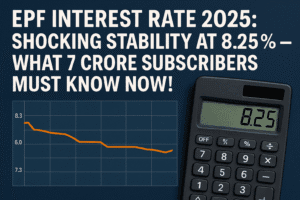EPF Interest Rate 2025: Shocking Stability at 8.25% – What 7 Crore Subscribers Must Know Now!
The Indian government has ratified an 8.25% interest rate on Employees’ Provident Fund (EPF) deposits for 2024-25, maintaining the same rate as the previous fiscal year. Approved by the Finance Ministry on May 23, 2025, this decision by the Employees’ Provident Fund Organisation (EPFO) ensures predictable returns for over 7 crore subscribers. The rate, consistent with 2023-24, reflects efforts to balance competitive yields amid economic fluctuations while outperforming many fixed deposits (6.5–7.5%) and aligning closely with inflation (around 5%).
Historically, rates have dipped from 8.5% (2020-21) to a four-decade low of 8.1% (2021-22) before stabilizing. Subscribers benefit from tax-free, compounded growth, though experts advise diversifying with equity-linked options for long-term goals. The move underscores EPFO’s focus on safeguarding retirement savings while navigating market dynamics.

EPF Interest Rate 2025: Shocking Stability at 8.25% – What 7 Crore Subscribers Must Know Now!
The Indian government has officially approved an 8.25% interest rate on Employees’ Provident Fund (EPF) deposits for the 2024-25 fiscal year, maintaining the same rate as the previous year. This decision, ratified by the Finance Ministry on May 23, 2025, ensures stability for over 70 million EPFO subscribers who rely on this retirement savings vehicle.
Key Details and Implications
Consistent Returns Amid Economic Flux
- By retaining the 8.25% rate, the EPFO prioritizes predictability for subscribers navigating economic uncertainties. While marginally lower than pre-pandemic rates (e.g., 8.5% in 2020-21), it remains competitive against many fixed-income options like bank FDs (currently averaging 6.5–7.5% for tenures above 5 years).
Timeline and Process
- The rate was initially proposed by the EPFO’s Central Board of Trustees on February 28, 2025.
- After mandatory Finance Ministry approval, the interest will now be credited to subscribers’ accounts by December 2025.
Historical Context
This marks the second consecutive year at 8.25%, following a decade of fluctuating rates:
- 2023-24: 8.25%
- 2022-23: 8.15%
- 2021-22: 8.10% (lowest since 1977-78)
Why This Matters for Subscribers
- Long-Term Savings Impact: For a monthly EPF contribution of ₹12,500 (employee + employer share), the 8.25% rate would generate approximately ₹1.03 lakh in annual interest, compounding tax-free until withdrawal.
- Inflation Hedge: With India’s inflation hovering around 5%, the real return (adjusted for inflation) remains positive at ~3.25%, safeguarding purchasing power.
- Comparison to Alternatives:
- PPF: Currently 7.1% (tax-free)
- NPS Equity Funds: Average 10–12% (market-linked, taxable)
- Senior Citizen Savings Scheme: 8.2% (taxable)
Expert Perspectives
Financial advisors note that while EPF offers safety, diversifying into higher-yield instruments like mutual funds or NPS could optimize retirement portfolios. “EPF is a cornerstone for risk-averse savers, but younger subscribers should balance it with equity exposure to combat longevity risk,” says Mumbai-based planner Riya Mehta.
Next Steps for Subscribers
- Verify Contributions: Ensure employer deposits are updated via the EPFO portal or UMANG app.
- Claim Tax Benefits: EPF contributions qualify under Section 80C (up to ₹1.5 lakh annually).
- Plan Withdrawals: Interest is tax-free if withdrawn after 5 years of continuous service.
Looking Ahead
The EPFO’s decision reflects a balancing act between subscriber returns and its own investment performance, which relies heavily on debt instruments and equity (15% allocation). With India’s bond yields stabilizing, analysts predict rates may hold steady in the near term unless macroeconomic shifts demand recalibration.
The 8.25% rate offers stability for risk-averse savers, but proactive financial planning—mixing EPF with growth-oriented assets—remains critical for long-term wealth creation. Subscribers should use this consistency to review their broader retirement strategy and consult advisors if needed.
You must be logged in to post a comment.